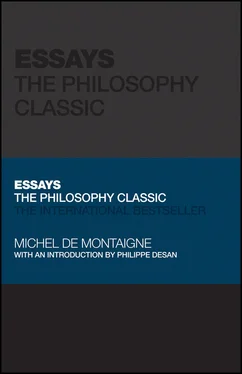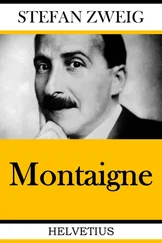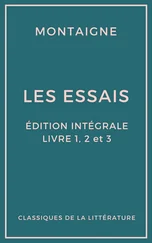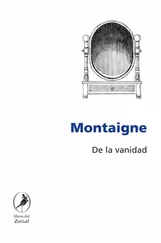Michel de Montaigne - Essays
Здесь есть возможность читать онлайн «Michel de Montaigne - Essays» — ознакомительный отрывок электронной книги совершенно бесплатно, а после прочтения отрывка купить полную версию. В некоторых случаях можно слушать аудио, скачать через торрент в формате fb2 и присутствует краткое содержание. Жанр: unrecognised, на английском языке. Описание произведения, (предисловие) а так же отзывы посетителей доступны на портале библиотеки ЛибКат.
- Название:Essays
- Автор:
- Жанр:
- Год:неизвестен
- ISBN:нет данных
- Рейтинг книги:3 / 5. Голосов: 1
-
Избранное:Добавить в избранное
- Отзывы:
-
Ваша оценка:
- 60
- 1
- 2
- 3
- 4
- 5
Essays: краткое содержание, описание и аннотация
Предлагаем к чтению аннотацию, описание, краткое содержание или предисловие (зависит от того, что написал сам автор книги «Essays»). Если вы не нашли необходимую информацию о книге — напишите в комментариях, мы постараемся отыскать её.
Essays: The Philosophy Classic
Essays: The Philosophy Classic
Essays — читать онлайн ознакомительный отрывок
Ниже представлен текст книги, разбитый по страницам. Система сохранения места последней прочитанной страницы, позволяет с удобством читать онлайн бесплатно книгу «Essays», без необходимости каждый раз заново искать на чём Вы остановились. Поставьте закладку, и сможете в любой момент перейти на страницу, на которой закончили чтение.
Интервал:
Закладка:
In plain truth, lying is an accursed vice. We are not men, nor have other tie upon one another, but by our word. If we did but discover the horror and gravity of it, we should pursue it with fire and sword, and more justly than other crimes. I see that parents commonly, and with indiscretion enough, correct their children for little innocent faults, and torment them for wanton tricks, that have neither impression nor consequence; whereas, in my opinion, lying only, and, which is of something a lower form, obstinacy, are the faults which are to be severely whipped out of them, both in their infancy and in their progress, otherwise they grow up and increase with them; and after a tongue has once got the knack of lying, it is not to be imagined how impossible it is to reclaim it whence it comes to pass that we see some, who are otherwise very honest men, so subject and enslaved to this vice. I have an honest lad to my tailor, whom I never knew guilty of one truth, no, not when it had been to his advantage. If falsehood had, like truth, but one face only, we should be upon better terms; for we should then take for certain the contrary to what the liar says: but the reverse of truth has a hundred thousand forms, and a field indefinite, without bound or limit. The Pythagoreans make good to be certain and finite, and evil, infinite and uncertain. There are a thousand ways to miss the white, there is only one to hit it. For my own part, I have this vice in so great horror, that I am not sure I could prevail with my conscience to secure myself from the most manifest and extreme danger by an impudent and solemn lie. An ancient father says “that a dog we know is better company than a man whose language we do not understand.”
Ut externus alienopene non sit hominis vice.
[As a foreigner cannot be said to supply us the place of a man.
—Pliny, Natural History . vii. I]
And how much less sociable is false speaking than silence?
King Francis I vaunted that he had by this means nonplussed Francesco Taverna, ambassador of Francesco Sforza, Duke of Milan, a man very famous for his science in talking in those days. This gentleman had been sent to excuse his master to his Majesty about a thing of very great consequence, which was this: the King, still to maintain some intelligence with Italy, out of which he had lately been driven, and particularly with the duchy of Milan, had thought it convenient to have a gentleman on his behalf to be with that Duke: an ambassador in effect, but in outward appearance a private person who pretended to reside there upon his own particular affairs; for the Duke, much more depending upon the Emperor, especially at a time when he was in a treaty of marriage with his niece, daughter to the King of Denmark, who is now dowager of Lorraine, could not manifest any practice and conference with us without his great interest. For this commission one Merveille, a Milanese gentleman, and an equerry to the King, being thought very fit, was accordingly despatched thither with private credentials, and instructions as ambassador, and with other letters of recommendation to the Duke about his own private concerns, the better to mask and colour the business; and was so long in that court, that the Emperor at last had some inkling of his real employment there; which was the occasion of what followed after, as we suppose; which was, that under pretence of some murder, his trial was in two days despatched, and his head in the night struck off in prison. Messire Francesco being come, and prepared with a long counterfeit history of the affair (for the King had applied himself to all the princes of Christendom, as well as to the Duke himself, to demand satisfaction), had his audience at the morning council; where, after he had for the support of his cause laid open several plausible justifications of the fact, that his master had never looked upon this Merveille for other than a private gentleman and his own subject, who was there only in order to his own business, neither had he ever lived under any other aspect; absolutely disowning that he had ever heard he was one of the King's household or that his Majesty so much as knew him, so far was he from taking him for an ambassador: the King, in his turn, pressing him with several objections and demands, and challenging him on all sides, tripped him up at last by asking, why, then, the execution was performed by night, and as it were by stealth? At which the poor confounded ambassador, the more handsomely to disengage himself, made answer, that the Duke would have been very loth, out of respect to his Majesty, that such an execution should have been performed by day. Any one may guess if he was not well rated when he came home, for having so grossly tripped in the presence of a prince of so delicate a nostril as King Francis.
Pope Julius II. having sent an ambassador to the King of England to animate him against King Francis, the ambassador having had his audience, and the King, before he would give an answer, insisting upon the difficulties he should find in setting on foot so great a preparation as would be necessary to attack so potent a King, and urging some reasons to that effect, the ambassador very unseasonably replied that he had also himself considered the same difficulties, and had represented them to the Pope. From which saying of his, so directly opposite to the thing propounded and the business he came about, which was immediately to incite him to war, the King of England first derived the argument (which he afterward found to be true), that this ambassador, in his own mind, was on the side of the French; of which having advertised his master, his estate at his return home was confiscated, and he himself very narrowly escaped the losing of his head. [Erasmus, Opus Epistolarum (1703), iv. col. 684.]
14 THAT THE WAY WE SEE GOOD AND EVIL DEPENDS ON THE OPINION WE HAVE OF THEM
Men, says Epictetus, are tormented with the opinions they have of things and not by the things themselves. It were a great victory obtained for the relief of our miserable human condition, could this proposition be established for certain and true throughout. For if evils have no admission into us but by the judgment we ourselves make of them, it should seem that it is, then, in our own power to despise them or to turn them to good. If things surrender themselves to our mercy, why do we not convert and accommodate them to our advantage? If what we call evil and torment is neither evil nor torment of itself, but only that our fancy gives it that quality, it is in us to change it, and it being in our own choice, if there be no constraint upon us, we must certainly be very strange fools to take arms for that side which is most offensive to us, and to give sickness, want, and contempt a bitter and nauseous taste, if it be in our power to give them a pleasant relish, and if, fortune simply providing the matter, it is for us to give it the form. Now, that what we call evil is not so of itself, or at least to that degree that we make it, and that it depends upon us to give it another taste and complexion (for all comes to one), let us examine how that can be maintained.
If the original being of those things we fear had power to lodge itself in us by its own authority, it would then lodge itself alike, and in like manner, in all; for men are all of the same kind, and saving in greater and less proportions, are all provided with the same utensils and instruments to conceive and to judge; but the diversity of opinions we have of those things clearly evidences that they only enter us by composition; one person, peradventure, admits them in their true being, but a thousand others give them a new and contrary being in them. We hold death, poverty, and pain for our principal enemies; now, this death, which some repute the most dreadful of all dreadful things, who does not know that others call it the only secure harbour from the storms and tempests of life, the sovereign good of nature, the sole support of liberty, and the common and prompt remedy of all evils? And as the one expect it with fear and trembling, the others support it with greater ease than life itself. That one complains of its facility:
Читать дальшеИнтервал:
Закладка:
Похожие книги на «Essays»
Представляем Вашему вниманию похожие книги на «Essays» списком для выбора. Мы отобрали схожую по названию и смыслу литературу в надежде предоставить читателям больше вариантов отыскать новые, интересные, ещё непрочитанные произведения.
Обсуждение, отзывы о книге «Essays» и просто собственные мнения читателей. Оставьте ваши комментарии, напишите, что Вы думаете о произведении, его смысле или главных героях. Укажите что конкретно понравилось, а что нет, и почему Вы так считаете.












